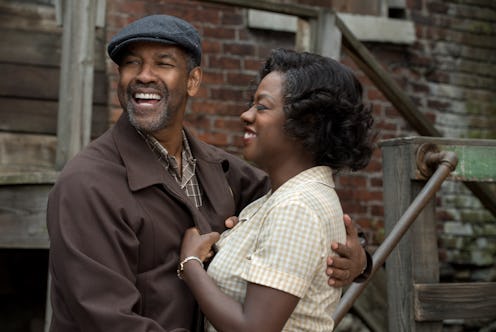
The family drama Fences is written by one man and directed by another, but female film professionals made their mark on the Oscar hopeful behind-the-scenes, too. The movie is adapted from August Wilson's 1986 Pulitzer Prize-winning play of the same name, and Denzel Washington reprises the lead role of Troy Maxon, a middle-aged working man providing for his family in Pittsburgh in the '50s. Washington also directed the film, putting together a team that includes director of photography Charlotte Bruus Christensen, costume designer Sharen Davis, and set decorator Rebecca Brown — all of whom tell Bustle about working with so many women on the film, even within a still male-dominated industry.
"I don’t think about it at all in my daily life, and I think that is probably my way of dealing with it," says Christensen of the gender disparity in her field. "I don’t want it to be about that. I want my work to be about what the work is." Fences is only the second American film Christensen has worked one; the Dutch cinematographer also created the alternatively gloomy and glossy look of The Girl On The Train. Her influence on Hollywood is still huge, though, as a research survey conducted by the Center for the Study of Women in Television and Film at San Diego State University found that only 6 percent of cinematographers who worked on the top-grossing 250 movies of 2015 were women.
Fences is a welcome outlier in the blended makeup of its creative team; as Davis says, the fact that the movie has a female director of photography "is definitely noticeable. So it was awesome. It was great." Still, as a whole, the film industry still has a long way to go before it achieves true gender equality. And while there are many problems to tackle, Christensen says a scarcity of qualified women isn't one of them. "It’s not a lack of talent out there from female artists," she says. "There are a lot of very, very talented female [directors of photography] and directors. It’s a matter of getting to the jobs."
As a mother, Christensen is very aware that, in addition to an industry bias, there are practical concerns that can also prevent women from being as free and transient as their male colleagues. "It takes a lot of effort to make this work," Christensen says, about balancing family and career. "But I love my job so much. Maybe there are women out there who have a lot more talent than me, but are not in a situation where they can leave. And for some reason, it seems easier to leave for the men. I know why."
Brown, meanwhile, emphasizes that the hustle is real, especially for women in film. But, she says, "I think anyone can do whatever they want to do if they work really hard at it." She adds that she feels "very privileged and honored" to have worked on Fences, a sentiment echoed by the other two women.
Davis, for instance, has worked with Washington on every film he's directed, yet she still says she was "honored" to be invited on to Fences. "I know how much it meant to him," she explains. As for Christensen, working with Washington wasn't intimidating, but refreshing. "You can’t think of who you’re meeting, you have to just be honest," she says. "But being in the meeting, I totally forgot who he was. And that’s what he does to you. It just becomes about the work." Adds Brown about her co-worker, "The really great part about this job was that Denzel was so accessible," she says. "He was everywhere we were."
You can see the vision of Washington and his many female collaborators when Fences opens wide on Christmas Day.